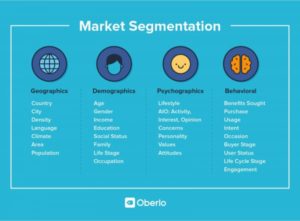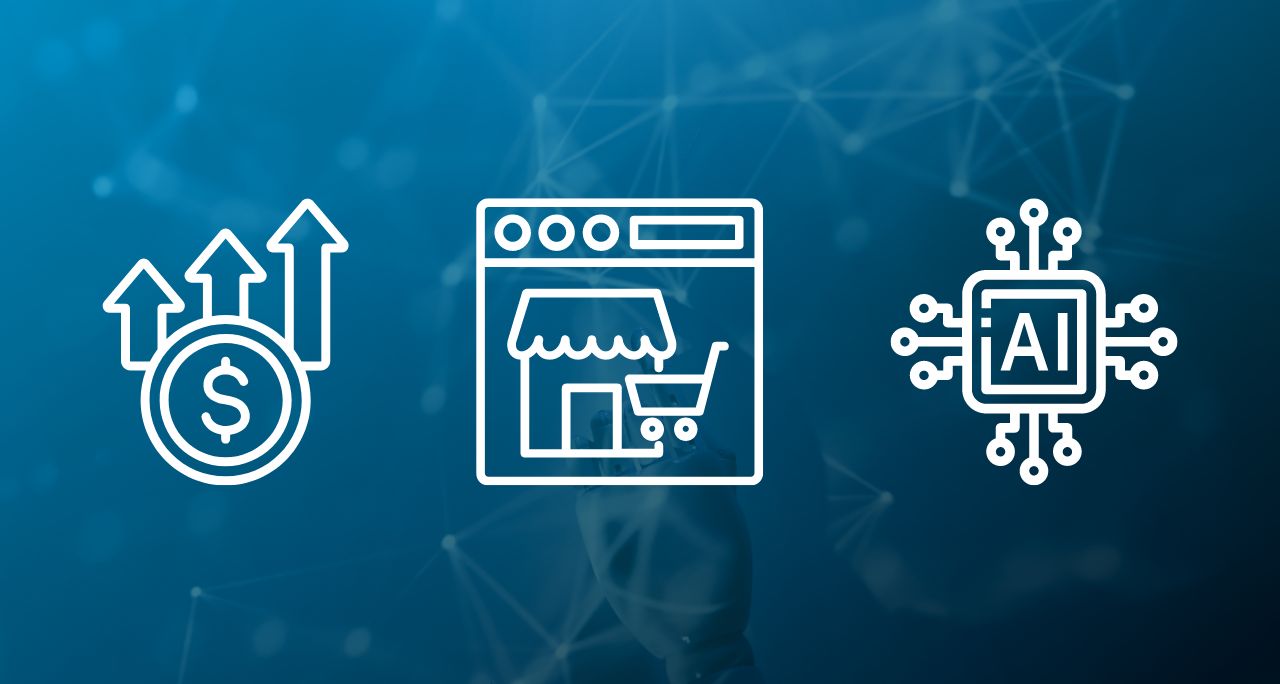Artificial intelligence is becoming an essential part of our daily lives. It has an impact on the way we live, the way we communicate, and even the way we shop.
As an eCommerce retailer, you must always remain on the cutting edge of new and emerging technologies. That’s why it’s important to understand the impact artificial intelligence has on the shopping experience and the various innovative ways you can incorporate it to improve your customers’ lives.
By embracing these modern tech trends, you’ll be able to stay ahead of your competitors and present a more modern and advanced overall product to your shoppers.
But how can you keep up with AI advancements hitting the market every day?
By understanding the key tentpoles of AI in eCommerce, you’ll be able to boost your revenue and run a far more efficient shop. In this article, we’re breaking down a list of the top ways AI can be applied to the commerce world. If you’re not currently offering these winning advancements, it might be time to start.
Chatbots
Chatbots have revolutionized one of the most vital pieces of the customer experience.
Its importance can’t be overstated. A whopping 89% of customers are likely to make a repeat purchase if they’ve had a positive customer support experience.
No one wants to wait to get support anymore. People demand 24/7 support, especially if your eCommerce store is serving many different timezones. But paying live support agents for overnight shifts can eat into your profits.

Thankfully, AI chatbots work 24/7/365. That means you’ll have support available in the middle of the night on Christmas day if need be.
What’s more, chatbots will take some heat off of your human support agents. These automated services will be able to handle common FAQs and simplistic issues that clog up a live agent’s day. That frees up your human support agents for more complicated issues that require their direct attention.
With the right chatbot, your customers might not know they’re dealing with a machine. These platforms use machine learning to gauge the emotions and needs of your audience and adapt accordingly based on the situation.
Customer-centric searching
AI has had a significant impact on the search functions of eCommerce websites, creating a customer-centric experience that is far more intuitive and gets to the heart of the customer’s wants and needs.
Once upon a time, your customers would search for a product or brand name. However, thanks to customer-centric search options powered by AI, they can now find the products they’re interested in by describing what they had in mind.
For example, a customer can type in “green sweaters” or “blue cleaning supplies” and get a complete list of corresponding products.
But it doesn’t stop there.
Thanks to AI, your customers can upload a photo of a product, and the system will scan your inventory to find something similar. That means if a customer likes their sister’s new jacket and wants to find one just like it, all they’ll need is a photo to upload. Once that’s done, the AI will get to work, finding either that exact item or one similar to it.
Retargeting
The AI systems at work in eCommerce stores worldwide are great tools to use for customer retargeting.
Often, customers browse online stores, leaving items in their cart or just reviewing product descriptions and images without making a purchase. Thanks to AI, we can retarget those customers and either reach out to them directly or create a personalized shopping experience when they return.
If you have a customer’s contact information, the AI system can reach out to let them know they have items in their cart or even offer them a personalized discount promotion to push them toward action.
Additionally, the AI can take note of products your customers have viewed and retarget them with these products on the homepage front and center when they return. This can be done even if the customer doesn’t have an account with you. The system can recognize cookies on your customer’s device and use that to retarget them with past interests.
Customer segmentation
Chances are your customers aren’t all in the same demographic group. You’ll have many ideal customers with their own customer profiles. AI systems can help you keep track of these leads, segment them, and market to them based on their needs.

Knowing who makes what purchases among the different types of products you sell on your website is vital to your sales and marketing plan. With the help of AI, you’ll be able to take concrete sales actions based on what segment a customer fits into. For example, an AI sales automation tool can take specific actions when it identifies that someone is using a debit card for teens.
The system understands this is likely a teenage customer and notes it in your database. It will then segment this customer into your teen customer profile and send them emails or text messages with promotions explicitly geared toward their wants and needs.

Artificial intelligence and various types of sales automation software can also help save time and effort when lead scoring. That’s the process of assigning a numerical score to your buyers based on their onsite behaviors, ranking them by their likelihood to purchase.
Automated lead scoring allows your company’s employees to concentrate on tasks that cannot be automated yet, which has a positive impact on the company’s revenue. For example, Hubspot lead scoring software simplifies the lead scoring process so much that only the smallest details are left for manual entry.
By embracing these platforms, you’ll get a good look at your customers, keeping track of who they are, what they want, which marketing strategies appeal to them, and where they are in your sales funnel.
Your various lead generation platforms and CRM solutions can be integrated with a service like LeadsBridge, which compiles all of these services into a centralized dashboard that’s easy to navigate.
Personalization
Everyone today wants a personalized shopping experience. That’s why AI solutions are working overtime to improve personalization efforts and make every customer feel as though your online store has been designed specifically with them in mind.
The machine learning system can learn a lot about your customers based on their shopping habits and on-site behaviors. It uses this data to build individual homepages and shopping recommendations for every customer, showing them products and promotions that have been chosen specifically based on what they want, need, and like.

For example, an AI system for a clothing eCommerce store can learn about a customer’s personal sense of style, and use their past purchases to recommend items and accessories that they would like. For example, if a customer recently bought a jacket through your store, the AI solution can recommend a purse and shoes that specifically work with that piece. If you’re an electronics online store, you might recommend specific games and controller accessories to someone who just purchased a new video game system. If you’re a digital security solutions provider, you can recommend products depending on whether the user is shopping for personal or business needs.
However, it can go even further. If you have someone who has shown an interest in specific gaming genres, these game recommendations can be tailored to that preference. For instance, the system won’t recommend sports games to someone who has previously expressed a heavy interest in fantasy role-playing games.
AI personalization is like having a personal shopper who learns all of your likes, dislikes, and buying preferences. That makes it far less convenient to switch to a competing store, even if they offer better pricing.
Improve your website elements
Not all eCommerce AI applications are customer facing. You can use artificial intelligence to optimize the design of your website, creating better content, images, and an intuitive design that will appeal to your target audience.
For example, something like an AI-based remove background API can chop unwanted elements out of your promotional images or product photos with just a few clicks — no Photoshop experience required.
AI can also make recommendations on the overall design of your site by showing you how your audience interacts with the store. You can see this through heat maps, which can help identify highly effective elements of the site and rage clicks that might indicate an issue.
These solutions can even help you with your content. AI content generators can learn your specific tone and writing style to generate product descriptions and landing page copy.
Of course, these services can’t replace the skills of an actual human writer. They can simply make the process easier. AI tools don’t work alone. For example, a writing tool using AI might be pulling information from grammar resource sites like Writing Tips. This ensures that the corrections and text generation coming from the AI is of an acceptable quality. You can then combine these systems with the talents of a professional SEO marketing writer looking for freelance writing jobs to create truly optimized store.
Implementation with appliances
eCommerce stores are starting to use AI to bring their shopping experiences to smart homes worldwide. Some of these advanced appliances feature touch screen interfaces that can connect to shopping platforms, allowing customers to make purchases right when they need them.
A great example of this phenomenon at work is LG’s InstaView refrigerator. It features a large touch screen interface on the door that can turn transparent when you tap it, giving you a full view of everything within.
These appliances have recently been upgraded with a virtual assistant and a webOS. That means if a customer notices that they’re running out of butter, they’ll be able to order more right from their refrigerator door using nothing more than their voice.

By making your store compatible with these appliances, you can incorporate your business into the modern smart home and increase the convenience factor exponentially for customers.
Work through wearable tech
Speaking of convenience, you can also use AI to create apps for wearable tech, which is becoming more common as the smart connected AI-driven experience expands to encompass all aspects of human life.
With something like a smartwatch, customers can make purchases through contactless payments. But that can be expanded to eCommerce, with apps that allow customers to search for products and purchase them using their voice.
These apps can also collect a wealth of data unlike anything we’ve ever seen before. Imagine measuring the interest of a customer in one of your products based off of vital statistics like their heart rate, pupil dilation, breathing, and more.
Data analytics
AI is revolutionizing data analytics by gathering information on your customers through every interaction and automatically compiling that data into reports that you can then learn from.
AI tools allow you to keep track of the sales you make through your online store in a way that’s clear and organized. For example, you can use a report builder software solution that lets you create accounting reports with only a few clicks. This allows you to analyze your data and develop informed strategies that will increase revenue.
Additionally, you can gather invaluable data on the overall customer experience, including your churn rate, retention rate, and levels of engagement. While data analytics isn’t new in the retail world, our ability to use AI to compile this data into an easily digestible format is revolutionary. It removes a time-consuming monotonous task from human employees and takes the issue of human error completely out of the equation.
Conclusion
AI is reshaping the eCommerce landscape. By understanding these advancements and investing in them early, you’ll be able to remain competitive and provide your customers with an optimized, personalized, automated experience that they’re going to want to experience again and again.
To review, AI can be applied in the digital commerce world through:
- Chatbots
- Customer-centric searches
- Retargeting
- Customer segmentation
- Personalization
- Website improvements
- Implementation with smart appliances
- Implementation with wearable tech
- Data analysis
By accepting and embracing these advancements, you’ll be able to create an advanced and efficient store that will see soaring profits for years to come.
Author Bio

Luca Ramassa Outreach Specialist at LeadsBridge, passionate about Marketing and Technology. My goal is to help companies improve their online presence and communication strategy.





